Module 9 Great inventions>Unit 3 Language in use习题课件(共20张PPT)
文档属性
| 名称 | Module 9 Great inventions>Unit 3 Language in use习题课件(共20张PPT) | 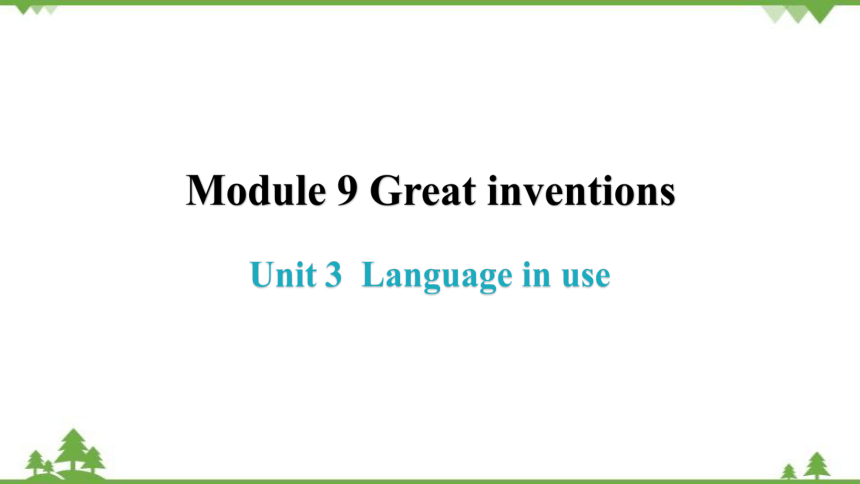 | |
| 格式 | pptx | ||
| 文件大小 | 101.9KB | ||
| 资源类型 | 教案 | ||
| 版本资源 | 外研版 | ||
| 科目 | 英语 | ||
| 更新时间 | 2022-06-18 10:13:39 | ||
图片预览


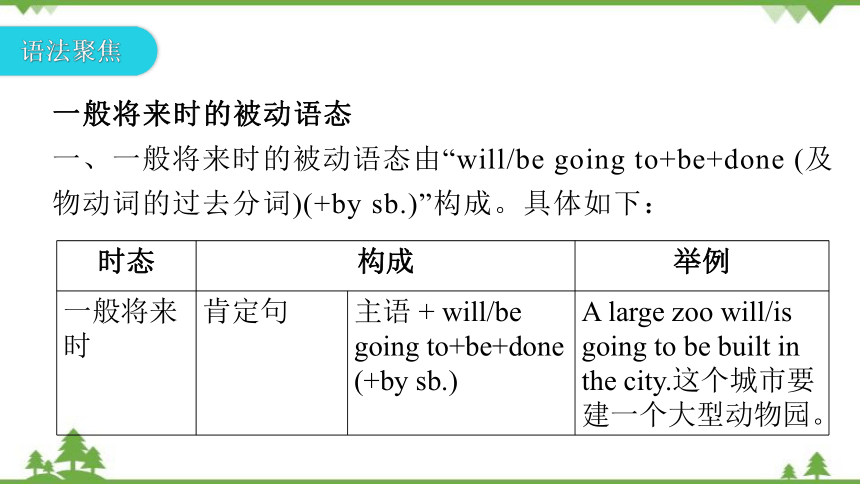
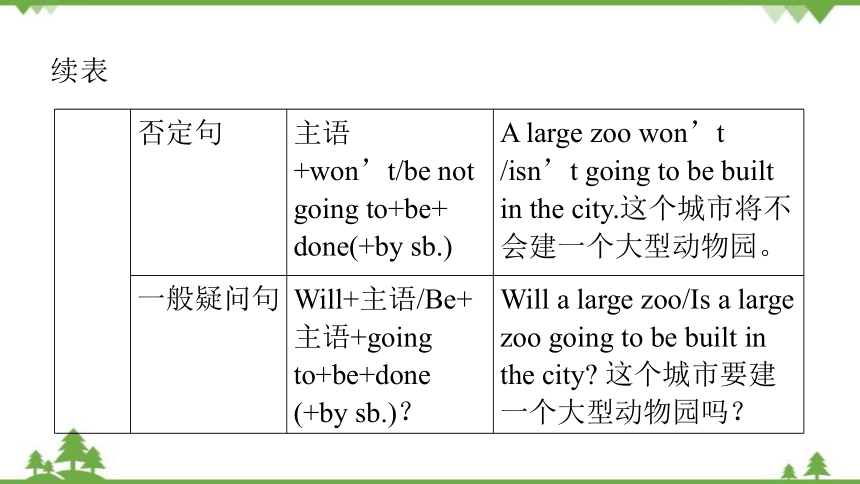


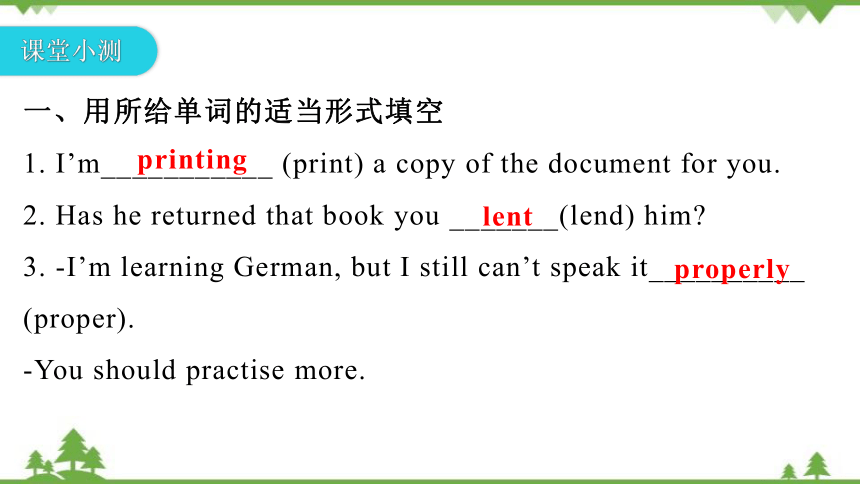
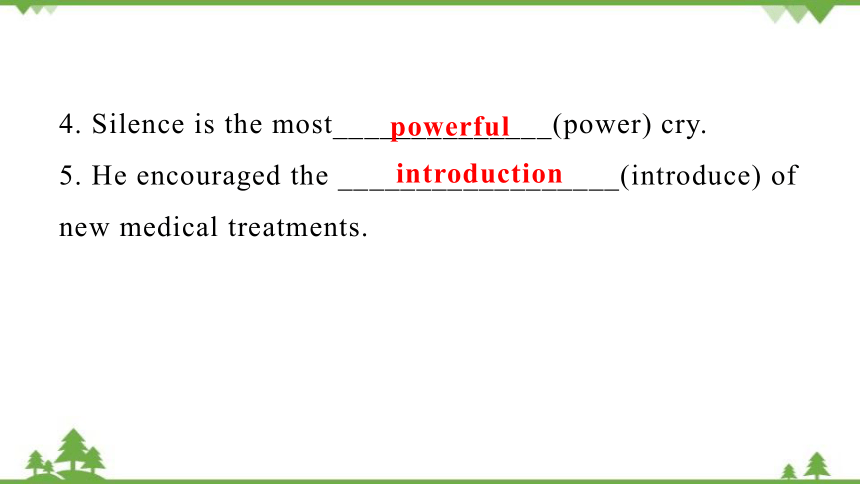
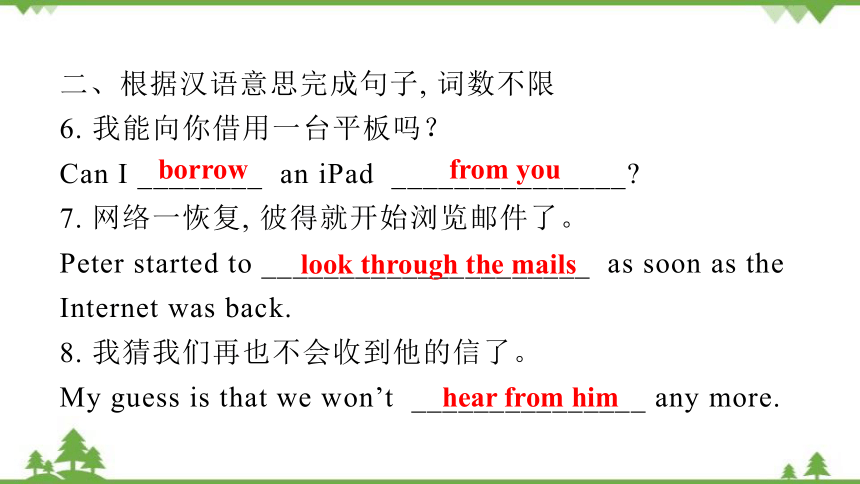
文档简介
(共20张PPT)
Unit 3 Language in use
Module 9 Great inventions
目录
语法聚焦
01
课堂小测
02
语法聚焦
一般将来时的被动语态
一、一般将来时的被动语态由“will/be going to+be+done (及物动词的过去分词)(+by sb.)”构成。具体如下:
时态 构成 举例
一般将来时 肯定句 主语 + will/be going to+be+done (+by sb.) A large zoo will/is going to be built in the city.这个城市要建一个大型动物园。
续表
否定句 主语+won’t/be not going to+be+ done(+by sb.) A large zoo won’t /isn’t going to be built in the city.这个城市将不会建一个大型动物园。
一般疑问句 Will+主语/Be+主语+going to+be+done (+by sb.)? Will a large zoo/Is a large zoo going to be built in the city 这个城市要建一个大型动物园吗?
续表
特殊疑问句 特殊疑问词+ will+主语/be+主语+going to+be+done (+by sb.)? What will/is going to be built in the city 这个城市要建一个什么?
二、常见被动语态肯定形式结构小结:
时态&语态 结构
一般现在时的被动语态 am/is/are+done
一般过去时的被动语态 was/were+done
一般将来时的被动语态 will/be going to+be+done
情态动词的被动语态 can/may/must/should …+be+done
课堂小测
一、用所给单词的适当形式填空
1. I’m___________ (print) a copy of the document for you.
2. Has he returned that book you _______(lend) him
3. -I’m learning German, but I still can’t speak it__________ (proper).
-You should practise more.
printing
lent
properly
4. Silence is the most______________(power) cry.
5. He encouraged the __________________(introduce) of new medical treatments.
powerful
introduction
二、根据汉语意思完成句子, 词数不限
6. 我能向你借用一台平板吗?
Can I ________ an iPad _______________
7. 网络一恢复, 彼得就开始浏览邮件了。
Peter started to _____________________ as soon as the Internet was back.
8. 我猜我们再也不会收到他的信了。
My guess is that we won’t _______________ any more.
borrow
from you
look through the mails
hear from him
9. 我妈妈不允许我在网上与陌生人聊天。
My mum _____________________ chat with strangers on the Internet.
10. 很难想象没有因特网的生活。
______________________________ life without the Internet.
doesn’t allow me to
It’s hard / difficult to imagine
三、单项填空(语法专练)
( )11. A new supermarket ____ in this neighbourhood so that people won’t have problem buying groceries(生活用品) in their daily life.
A. is building B. should build
C. should be built D. was built
C
( )12. Have you heard that the 2022 Winter Olympics ___ in Beijing
A. will hold B. are held
C. is being held D. will be held
( )13. It is reported that a new theatre ___ in September this year.
A.completes B.is completed
C.will complete D.will be completed
D
D
( )14. The mobile phone has influenced people’s life a lot since it ____.
A. invents B. invented
C. is invented D. was invented
( )15. This writer’s books are popular. They___ by many teenagers.
A. is read B. was read
C. are read D. were read
D
C
四、语法选择(核心素养:思维品质)
What do you think of a“talking kitchen” A French Digital Kitchen has been developed at Newcastle University in 16 UK. It teaches students 17 cook French food and speak French at the same time. For the first time students can learn a language 18 the following cooking steps.
All grammar and vocabularies have been 19 chosen to make sure the users can understand French well. After learning for some time, the users can test themselves by doing a short test on the computer.
The kitchen project 20 by Professor Paul. He became interested in the idea after he visited another talking kitchen. He said, “The purpose of the French Digital
Kitchen is to make learning a language 21 and more educational.”
How does the kitchen work There is a computer in the kitchen. With this computer the users can first choose a French recipe (食谱) that they want to follow. 22 information in the computer, the kitchen starts to guide the users to make a French dish. 23 you follow the instructions
on the computer, it moves on to the next. If you go wrong, the programme me goes back and repeats the recipe or information. At any time, the users can also ask the kitchen 24 recipe or any information.
The new kitchen 25 in schools, universities and even people’s homes. The researchers will also develop the European Digital Kitchen for the next three years.
( )16. A. / B. an C. the D. a
( )17. A. how to B. what to C. how D. what
( )18. A. in B. with C. by D. for
( )19. A. care B. caring
C. careful D. carefully
( )20. A. starting B. has started
C. was started D. will be started
C
A
C
D
C
( )21. A. more interested B. interesting
C. interested D. more interesting
( )22. A. To use B. Using C. Used D. Use
( )23. A. If B. Unless C. As soon as D. Until
( )24. A. repeat B. repeating C. repeats D. to repeat
( )25. A. was used B. is using
C. can be used D. used
D
B
A
D
C
课后作业
Unit 3 Language in use
Module 9 Great inventions
目录
语法聚焦
01
课堂小测
02
语法聚焦
一般将来时的被动语态
一、一般将来时的被动语态由“will/be going to+be+done (及物动词的过去分词)(+by sb.)”构成。具体如下:
时态 构成 举例
一般将来时 肯定句 主语 + will/be going to+be+done (+by sb.) A large zoo will/is going to be built in the city.这个城市要建一个大型动物园。
续表
否定句 主语+won’t/be not going to+be+ done(+by sb.) A large zoo won’t /isn’t going to be built in the city.这个城市将不会建一个大型动物园。
一般疑问句 Will+主语/Be+主语+going to+be+done (+by sb.)? Will a large zoo/Is a large zoo going to be built in the city 这个城市要建一个大型动物园吗?
续表
特殊疑问句 特殊疑问词+ will+主语/be+主语+going to+be+done (+by sb.)? What will/is going to be built in the city 这个城市要建一个什么?
二、常见被动语态肯定形式结构小结:
时态&语态 结构
一般现在时的被动语态 am/is/are+done
一般过去时的被动语态 was/were+done
一般将来时的被动语态 will/be going to+be+done
情态动词的被动语态 can/may/must/should …+be+done
课堂小测
一、用所给单词的适当形式填空
1. I’m___________ (print) a copy of the document for you.
2. Has he returned that book you _______(lend) him
3. -I’m learning German, but I still can’t speak it__________ (proper).
-You should practise more.
printing
lent
properly
4. Silence is the most______________(power) cry.
5. He encouraged the __________________(introduce) of new medical treatments.
powerful
introduction
二、根据汉语意思完成句子, 词数不限
6. 我能向你借用一台平板吗?
Can I ________ an iPad _______________
7. 网络一恢复, 彼得就开始浏览邮件了。
Peter started to _____________________ as soon as the Internet was back.
8. 我猜我们再也不会收到他的信了。
My guess is that we won’t _______________ any more.
borrow
from you
look through the mails
hear from him
9. 我妈妈不允许我在网上与陌生人聊天。
My mum _____________________ chat with strangers on the Internet.
10. 很难想象没有因特网的生活。
______________________________ life without the Internet.
doesn’t allow me to
It’s hard / difficult to imagine
三、单项填空(语法专练)
( )11. A new supermarket ____ in this neighbourhood so that people won’t have problem buying groceries(生活用品) in their daily life.
A. is building B. should build
C. should be built D. was built
C
( )12. Have you heard that the 2022 Winter Olympics ___ in Beijing
A. will hold B. are held
C. is being held D. will be held
( )13. It is reported that a new theatre ___ in September this year.
A.completes B.is completed
C.will complete D.will be completed
D
D
( )14. The mobile phone has influenced people’s life a lot since it ____.
A. invents B. invented
C. is invented D. was invented
( )15. This writer’s books are popular. They___ by many teenagers.
A. is read B. was read
C. are read D. were read
D
C
四、语法选择(核心素养:思维品质)
What do you think of a“talking kitchen” A French Digital Kitchen has been developed at Newcastle University in 16 UK. It teaches students 17 cook French food and speak French at the same time. For the first time students can learn a language 18 the following cooking steps.
All grammar and vocabularies have been 19 chosen to make sure the users can understand French well. After learning for some time, the users can test themselves by doing a short test on the computer.
The kitchen project 20 by Professor Paul. He became interested in the idea after he visited another talking kitchen. He said, “The purpose of the French Digital
Kitchen is to make learning a language 21 and more educational.”
How does the kitchen work There is a computer in the kitchen. With this computer the users can first choose a French recipe (食谱) that they want to follow. 22 information in the computer, the kitchen starts to guide the users to make a French dish. 23 you follow the instructions
on the computer, it moves on to the next. If you go wrong, the programme me goes back and repeats the recipe or information. At any time, the users can also ask the kitchen 24 recipe or any information.
The new kitchen 25 in schools, universities and even people’s homes. The researchers will also develop the European Digital Kitchen for the next three years.
( )16. A. / B. an C. the D. a
( )17. A. how to B. what to C. how D. what
( )18. A. in B. with C. by D. for
( )19. A. care B. caring
C. careful D. carefully
( )20. A. starting B. has started
C. was started D. will be started
C
A
C
D
C
( )21. A. more interested B. interesting
C. interested D. more interesting
( )22. A. To use B. Using C. Used D. Use
( )23. A. If B. Unless C. As soon as D. Until
( )24. A. repeat B. repeating C. repeats D. to repeat
( )25. A. was used B. is using
C. can be used D. used
D
B
A
D
C
课后作业
同课章节目录
- Module 1 Wonders of the world
- Unit 1 It's more than 2,000 years old.
- Unit 2 The Grand Canyon was not just big.
- Unit 3 Language in use
- Module 2 Public holidays
- Unit 1 My family always go somewhere interesting a
- Unit 2 We have celebrated the festival since the f
- Unit 3 Language in use
- Module 3 Heroes
- Unit 1 She trained hard,so she became a great play
- Unit 2There were few doctors, so he had to work ve
- Unit 3 Language in use
- Module 4 Home alone
- Unit 1 I can look after myself, although it won’t
- Unit 2 I became so bored with their orders that I
- Unit 3 Language in use
- Module 5 Museums
- Unit 1 Don't cross that rope!
- Unit 2 If you ever go to London, make sure you vis
- Unit 3 Language in use
- Module 6 Problems
- Unit 1 If I start after dinner, I'll finish it be
- Unit 2 If you tell him the truth now, you will sho
- Unit 3 Language in use
- Revision Module A
- Module 7 Great books
- Unit 1 We're still influenced by Confucius's idea
- Unit 2 It is still read and loved.
- Unit 3 Language in use
- Module 8 Sports life
- Unit 1 Daming wasn't chosen for the team last time
- Unit 2 He was invited to competitions around the w
- Unit 3 Language in use
- Module 9 Great inventions
- Unit 1 Will computers be used more than books in t
- Unit 2 Will books be replaced by the Internet?
- Unit 3 Language in use
- Module 10 Australia
- Unit 1 I have some photos that I took in Australia
- Unit 2 The game that they like most is Australian
- Unit 3 Language in use
- Module 11 Photos
- Unit 1 He's the boy who won the photo competition
- Unit 2 The photo which we liked best was taken by
- Unit 3 Language in use
- Module 12 Save our world
- Unit 1 If everyone starts to do something, the wor
- Unit 2 Repeat these three words daily: reduce, reu
- Unit 3 Language in use
- Revision Module B
